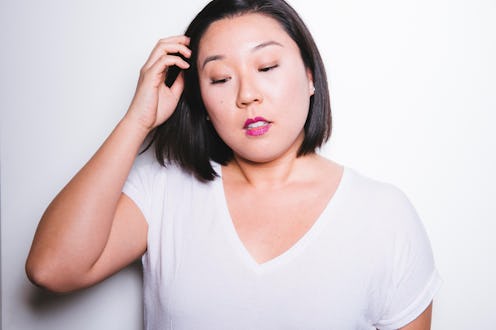
If your digestive tract is unpredictable during that time of the month, know that you're not alone. While not everyone talks about it, it's actually quite common to experience bowel changes during your period in the form of constipation and bloating, gassiness, and diarrhea — or all of the above. And that's all thanks to your hormones.
"When the estrogen and progesterone hormones fluctuate a few days before your period starts, there is an increase of prostaglandins, which are chemicals that are released during your cycle to give your uterus and intestines leeway to contract," Dr. Jessica Shepherd, MD, MBA, gynecologist and U by Kotex partner, tells Bustle.
Basically, prostaglandins are what help squeeze out your uterine lining, if a fertilized egg hasn't implanted, and you are in fact getting your period. The body can go a bit overboard, though, in terms of how many prostaglandins it sends to that area. According to Popular Science, a few prostaglandins can come in contact with the bowels, which are located right next to the uterus. And while not everyone will experience side effects, some can feel nauseated, or even have diarrhea as a result.
"Prostaglandins released during menstrual cycles have also been shown to increase nerve sensation," Dr. Shepherd says, "potentially also increasing sensitivity to pain and discomfort." This is what contributes to your cramps, and all those other achey sensations going on during your period.
"It’s different for everyone," Dr. Shepherd says. "Some women poop more during their periods, while others experience constipation during that time of the month." Bowel changes like these can occur as early as a few days prior to the start of your cycle, she says, and can last a few days into the cycle, when things should start to go back to normal.
Prostaglandins play a major role in bowel changes, as well as the aforementioned hormone, progesterone. "[During] the second half of the cycle, progesterone is high and bowel movements are less frequent," Dr. Amy Beckley, founder of Proov, tells Bustle, which is another reason why you might not poop as often as you usually do.
That said, "when your period approaches, progesterone drops and the bowels start to move faster, causing many women to experience high frequency of bowel movements and more abdominal discomfort," Dr. Beckley says. Cut to urgent bouts of period diarrhea, otherwise known as frequent bowel movements, during the first few days of your period.
The start of your period won't always be a joyous time for you or your bowels, thanks to these frequent (or not so frequent) trips to the bathroom. But there are ways to relieve symptoms.
"Exercise and diet can help in managing digestive changes," Dr. Shepherd says, as well as drinking plenty of water. You might want to make an effort to eat healthier foods, for example, while also going on more walks, or doing yoga as a way to keep things moving.
"Pain medication that decreases inflammation [...] can help with pain, especially if it is taken the day before you start your cycle," Dr. Shepherd says. So you might want to consider keeping some medication on hand, and taking a pain pill before symptoms start.
You may be able to relieve symptoms, but if not, don't worry. These bowel changes are a common part of the menstrual cycle, and don't necessarily mean anything is wrong. If you're really feeling bad, though, you can always let your doctor know.
They may be able to shed more light onto why you're experiencing bowel changes, and also offer advice as to how to feel better.